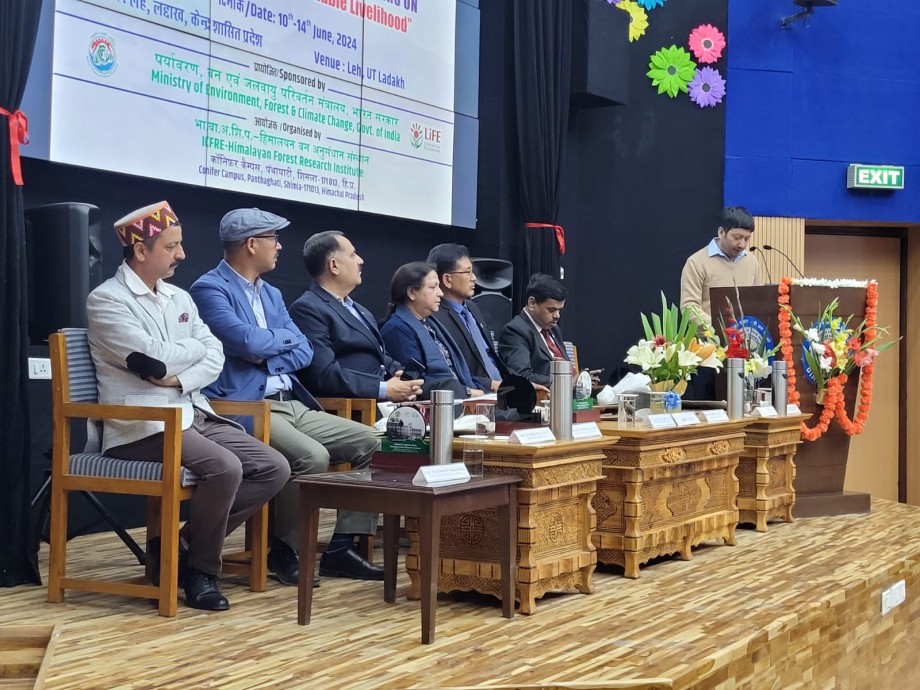Eco-Tourism training for IFS Officers commences in Leh

Training program on Eco-Tourism as Sustainable Livelihood has kicked off for Indian Forest Service (IFS) Officers in Leh. The initiative, hosted by the ICFRE-Himalayan Forest Research Institute, Shimla and financially supported by the Ministry of Environment, Forest and Climate Change, Government of India, aims to equip 25 IFS Officers from various states and union territories with essential skills and knowledge.
The training is scheduled to run from June 10 to June 14 , focusing on enhancing their expertise in promoting eco-friendly tourism practices.
Kanchan Devi, IFS, Director General of the Indian Council of Forestry Research and Education (ICFRE), commended the training initiatives undertaken by the Himalayan Forest Research Institute (HFRI) in Shimla. She highlighted the significance of the Indian Himalayan Region (IHR) as a major hub of biodiversity and stressed the importance of ecotourism as a means of generating employment while preserving the region's natural treasures. Devi underscored the necessity of ensuring that ecotourism initiatives do not disrupt the fragile ecosystems of the Himalayas, including the Trans-Himalayan region, and urged for meticulous planning to achieve this balance. She advocated for sustainable development practices that prioritize environmental preservation, emphasizing the need for eco-tourism activities to be planned with minimal impact on the ecology and environment. Devi expressed optimism that the training program would prove beneficial for officers across various domains of work.
Dr. Mohamad Ibrahim, Scientist and Training Coordinator, outlined the primary objective of the training program: to equip IFS Officers with knowledge about Ecotourism as a Sustainable Livelihood, empowering them to explore Ecotourism opportunities within their respective areas of operation and to facilitate local employment generation. He explained that the training program will feature presentations from a diverse range of experts, including scientists and officers from institutions such as ICFRE-Himalayan Forest Research Institute, Shimla, UNDP, Uttarakhand, National Institute of Sowa-Rigpa, Leh, Ladakh, UT, TERI School of Advanced Studies, Delhi, University of Ladakh, and Snow Leopard Conservancy India Trust, along with representatives from various NGOs, who will delve into different facets of Ecotourism.
Dr. Sandeep Sharma, Director of the Himalayan Forest Research Institute, Shimla, also addressed the participants, providing insights into the institute's mandate and its ongoing research endeavors, particularly in the realms of Conifer species and medicinal plants. He highlighted the institute's successful development of nursery and plantation techniques for Juniperus Polycarpus (Shukpa), a vital tree species in cold desert regions. Sharma mentioned the establishment of a demonstration plot for Shukpa at Badami Bagh, Leh, and the distribution of Shukpa seedlings among farmers in Kargil and Leh, underscoring the institute's commitment to practical conservation efforts and community engagement.
During the technical session, Jigmet Takpa, IFS (Former Principal Chief Conservator of Forests, Ladakh, UT), engaged with participants, extensively elaborating on the potential and opportunities for developing ecotourism in the Ladakh region. Drawing from his vast experience, Takpa illuminated the manifold works undertaken in ecotourism across Ladakh. He implicitly underscored ecotourism's potential to preserve natural resources while enhancing the livelihoods of local communities. Takpa vividly discussed Ladakh's pristine biodiversity, highlighting its ecological significance and the adaptations nature has bestowed upon its inhabitants to endure the region's harsh environmental conditions.
B. M. Sharma, IFS (Additional Principal Chief Conservator of Forests and Chief Wildlife Warden, Ladakh, UT), delivered an informative discourse on the remarkable wildlife indigenous to the Ladakh region, including the elusive Snow Leopard and the elegant Black-necked Crane. Dr. Sharma also expounded on the ecological importance of Juniper within the Ladakhi context. During the interactive session, he delved into the challenges and issues confronting wildlife management, while also exploring potential management strategies.
Over the course of the five-day training program, participants will embark on a series of field visits and engage in presentations and discussions aimed at deepening their understanding of ecotourism and its various dimensions.
The itinerary includes visits to Shey and Thiksey Monasteries, as well as the Meditation Centre, offering insights into pilgrimage tourism within the Leh region. Additionally, participants will explore Pather Sahib, the Hall of Fame, and Shanti Stupa. Excursions to Khardungla, Hunder, and the Nubra Valley will showcase adventure and sand-dune ecotourism, while a visit to Pangong Lake will highlight eco-tourism activities geared towards sustainable income generation and fostering interaction with local communities in Ladakh, UT.
The subsequent five days will feature presentations and discussions covering a range of topics, including the challenges and opportunities associated with ecotourism development, the impact of ecotourism on local rural communities in the Himalayan region, the role of Indigenous Traditional Knowledge (ITK) in ecotourism promotion, ecotourism's role in transformative economies, the avian diversity of Ladakh as a potential recreational and ecotourism asset, ecological initiatives aimed at wildlife conservation to promote adventure ecotourism in the Himalayan region, and the interplay of sustainability and stakeholders in ecotourism endeavors.





